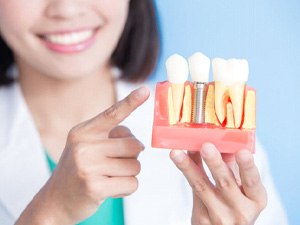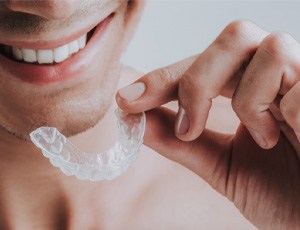Dental Implants — Fayetteville, NY
Permanent Tooth Replacement for a Fully Restored Smile
 Do you have missing teeth you need to replace? At Lyndon Family Dental, we offer a range of restorative services that can help you complete your smile, from traditional bridges to removable partials and dentures. Of all the services we offer, none can recreate the feel of a natural smile the way dental implants in Fayetteville can. That's because implant-supported restorations go further than traditional restorations. This option won't just replace your missing tooth (or teeth), it replaces your missing root structure. As a result, you can expect more stable and functional results.
Do you have missing teeth you need to replace? At Lyndon Family Dental, we offer a range of restorative services that can help you complete your smile, from traditional bridges to removable partials and dentures. Of all the services we offer, none can recreate the feel of a natural smile the way dental implants in Fayetteville can. That's because implant-supported restorations go further than traditional restorations. This option won't just replace your missing tooth (or teeth), it replaces your missing root structure. As a result, you can expect more stable and functional results.
Why Choose Lyndon Family Dental for Dental Implants?
- Partnered with Trusted Specialists
- Multiple Financing Options Available
- 98% Dental Implant Success Rate
What Are Dental Implants?

A single-tooth dental implant restores your tooth from the roots up. A dental implant is a titanium post that is surgically placed in the jawbone to act as an artificial tooth root. Once fused to the jaw, your dentist in Fayetteville can place a personalized dental crown on top of it to complete your smile. The result is a seamless replacement that blends in with the rest of your teeth.
The Dental Implant Process

After your initial consultation, you’ll have your implant surgery, where a single dental implant is placed in your jawbone. Then, you will begin a healing period called osseointegration, which typically takes between 3 and 4 months. After your implant has healed, you’ll come back into our office, where we will attach a small connector called an abutment before taking impressions of your smile. Lastly, these impressions are used to create your lifelike restoration. Once your crown is placed, you can enjoy an amazing, full, and strong set of teeth.
Benefits of Dental Implants

Dental implants are considered the gold standard when it comes to tooth replacement. Simply put, they’re capable of replacing lost teeth in terms of look, feel, and functionality – which is why over half a million of these incredible posts are placed annually. They offer all sorts of benefits, ranging from assistance with simple daily tasks to guiding patients toward a lifetime of healthy smiling. To learn more about the benefits of receiving dental implants in Fayetteville, continue reading below!
Day-to-Day Benefits

Patients who receive dental implants will have a noticeably easier time navigating various daily tasks. Consider these day-to-day benefits:
- Since dental implants function as tooth roots, they can help to restore roughly 80% of a person's original bite force. This means that they come with virtually no dietary restrictions, and you can eat as you please.
- Dental implants don’t come with an adjustment period in which you’ll have to relearn how to speak correctly, as is the case with dentures.
- Dental implants don’t require special cleaning materials or sophisticated maintenance. You simply care for them like you would your natural teeth.
Health Benefits

Teeth are more than just tools for biting, chewing, and speaking—they also play an important role in maintaining your health! Dental implants can replicate some of these benefits, including:
- Even having just one missing tooth can increase the risk of dental drift, which causes your remaining natural teeth to slowly shift towards any gaps in your grin. Implants can serve as placeholders, ensuring that all of your teeth remain in place.
- The roots of your teeth don’t just serve as anchors for your pearly whites; they also provide healthy stimulation to your jawbone, encouraging it to grow. When the teeth are lost, so is this stimulation. By fusing with your jaw, dental implant posts can replicate this stimulation.
- Research shows that tooth loss is linked to several other illnesses, some of which have nothing to do with your smile, such as cardiovascular disease. Since implants replace your teeth, they can offer similar protection from such threats.
Long-Term Benefits

Dental implants are a long-term investment in your smile; you aren’t just replacing your teeth to assist with the short-term, but rather, you’re committing to a lifetime of happy and healthy smiling! Consider these awesome long-term benefits:
- Under ideal circumstances, dental implants can last for several decades. Their impressive success rate of 95% holds true even after 10 years! There’s no better or longer-lasting solution for tooth replacement.
- Dental implants are considered incredibly cost-effective in the long run since they won’t need to be repaired or replaced like traditional options such as bridges or dentures.
- A beautiful and complete smile is often associated with youth, whereas missing teeth are often associated with older age. So if you rebuild your grin with dental implants, your confidence will soar for many years to come, and you’ll look and feel much younger!
Who Dental Implants Can Help

Besides the almost natural results they produce, dental implants are attractive for another reason: versatility. Whether you need to replace a single tooth, a few teeth, or an entire row of teeth, you can get the help you need with dental implants. During your consultation, we'll assess your needs and make a treatment recommendation. You may need a single implant-supported crown, or you might benefit from an implant-supported partial or full denture. As a practice committed to providing patients exceptional care, we'll help you find the solution that's right for you.
Learn More About Implant Dentures
- Missing 1 Tooth: If only one tooth is missing, your dentist in Fayetteville will make a small incision in the gum line and drill a hole into your jawbone to place the implant. After 3 to 6 months of healing and allowing the implant to properly fuse to the bone, you’ll return to have the custom restoration added to the top of your implant.
- Missing Multiple Teeth: Are you missing several teeth in a row? Not a problem! Dr. Rinoldo might suggest a bridge to give you the support and appearance you want and deserve. Placing implants on either side of the gap, the three custom-made restorations will be fused together to create a bridge. Unlike a traditional fixed bridge, this gives your bone the stimulation it needs, and it prevents having to alter healthy teeth so crowns can be placed to serve as anchors.
- Missing All Teeth: If you’re missing all your teeth on an entire arch, you can benefit from an implant-supported denture. Traditional dentures only give you the look of a fully restored smile, but an implant-supported denture is surgically placed, not only strengthening the bone but also giving you a complete smile that will stay in place. Additionally, you can expect your new restoration to last much longer than traditional dentures.
Understanding the Cost of Dental Implants

There’s no specific number associated with dental implants. Why? Because every patient is different, as well as their individual needs and factors. When scheduling a consultation with Dr. Rinoldo, you can expect her to consider various factors that can affect the cost of the procedure. Until then, here’s what to expect regarding the price of dental implants.
Preliminary Treatments & Dental Implant Surgery

Before undergoing this extensive procedure, our team will need to ensure that you aren’t experiencing any underlying complications in your smile, such as gum disease or inadequate jawbone density, which can be problematic for the success of your treatment. In some cases, patients may require preliminary services like tooth extractions, periodontal treatment, or even bone grafting so that their mouths are prepared for dental implants. The good news is that many of these treatments can be partially covered by dental insurance, reducing your out-of-pocket expenses. The surgery itself will also incur its unique price, and our team can discuss your estimate with you during your consultation.
The Parts of Your Dental Implant

Here are some of the main factors that will impact the price of your procedure:
- The number of implants: Patients who require several dental implants to rebuild their smile will generally pay more than someone who only needs one post.
- The type of restoration: Dental crowns, bridges, and dentures will each come with their unique price ranges. In most instances, the smaller the restoration, the lower the cost.
- The materials used: While most dental implants are constructed out of titanium, they can be made with other materials as well, such as zirconia, which can have a different cost.
- The brand of implants: There are a variety of dental implant manufacturers that offer unique prices for these metal posts.
How Dental Implants Can Save You Money

Although it might seem at first to be more affordable to opt for other tooth replacement solutions, such as dental bridges or dentures, you’ll want to remember the advantages that come with dental implants. While the former options offer convenience, the latter can provide results that last several decades or much more with proper care. Instead of needing to replace prosthetics after several years, you can save money with dental implants while having them remain stable and durable for much longer. Since the metal posts also work like natural teeth, you won’t require special products to maintain them, which can impact the overall price in the long run.
Does My Dental Insurance Cover Dental Implants?

While dental insurance doesn’t often cover the cost of dental implants, you’ll still want to consult your insurer about the details of your policy. In some situations, your provider can offer coverage for parts of the treatment, such as the preliminary services and final restoration(s). Our team will be more than happy to walk you through the ins and outs of your plan so that you can make the most of your insurance plan.
Making Dental Implants Affordable

If you aren’t currently covered by insurance, then you might consider alternative financing options to minimize your expenses. Our office is proud to offer plans through CareCredit—a third-party financier that can split up the total cost of your treatment into monthly installments. These plans also typically come with low to zero interest, meaning you can save more while rebuilding your smile.
Maintaining & Caring for Your Dental Implants

Dental implants have a much longer lifespan than traditional dentures and bridges, but they still require maintenance. You need to be able to protect your dental implants from damage and practice good oral hygiene at all times if you want your new smile to last for the rest of your life. The tips below can help you get the most out of your implants; if you would like additional advice or have concerns about the impact your lifestyle might have on your prosthetic teeth, call us today.
Make Oral Hygiene a Priority

When bacteria accumulate around your dental implants, they can cause a condition similar to gum disease known as peri-implantitis. Untreated peri-implantitis is a leading cause of implant failure due to the damage it does to the jawbone. To protect your implant, you need to keep up a good oral hygiene routine. Brush at least two times every day for two minutes each. Be sure to floss in order to remove bacteria from the spaces that a toothbrush can’t reach. For optimal oral cleanliness, consider rinsing with an ADA-approved mouthwash.
Eat a Healthy Diet

A poorly balanced diet can have grave implications for any smile. If you want to keep your gums healthy and protect your implants, you need to minimize the amount of sugar and starch you consume daily. Look for foods that promote a healthy environment for dental implants, such as fruits and vegetables filled with vitamin C or fat-free dairy products that provide plenty of calcium. Feel free to ask us for suggestions regarding implant-friendly foods.
Break Bad Habits

It’s important to stop smoking before dental implants are placed. Tobacco tends to suppress the body’s ability to heal and increases the risk of infection. You should also try to drop bad habits that can damage dental implants. That means:
- No chewing on pens or any other hard, inedible objects.
- No biting or chewing on your fingernails.
- No crunching ice or other hard foods.
- No using your teeth as tools to open jars and packages.
Protect Your Dental Implants

If you grind your teeth when stressed, you might need to give your implants extra protection during the night. Ask us for a mouthguard that you can wear while you sleep in order to prevent the upper and lower arches from making direct contact with each other. If you play sports, make sure that you wear your mouthguard out on the field.
Schedule Regular Dental Checkups

Just like with natural teeth, taking care of your dental implants is much easier when you have the help of a skilled, experienced dentist. Dr. Rinoldo can recognize the early signs of peri-implantitis and other issues that could lead to implant failure; furthermore, regular cleanings will go a long way towards preventing problems from occurring in the first place. Schedule your next appointment right away if you haven’t been to the dentist in at least six months.
Dental Implant FAQs

As one of the most complex services that modern dentistry has to offer, dental implants can bring up a lot of questions. Before you go through with this treatment, we want you to fully understand it. That’s why we’ve laid out the answers to some of the dental implant questions that we get asked the most frequently here at Lyndon Family Dental. For further questions that aren’t answered here on this page, don’t hesitate to get in touch with our friendly and helpful team.
Am I a Good Candidate for Dental Implants?
As long as you’re missing one or more teeth, are in good oral health, and have a strong jawbone, you’ll very likely be eligible for dental implants. During your consultation with Dr. Rinoldo, she can examine your mouth and let you know whether there are any issues – such as gum disease or low jawbone density – that must be addressed before receiving implants. From there, she can help you get the treatment you need. Ultimately, the only way to know for sure whether implants are right for you is to schedule a consultation!
How Can I Make Sure My Implants Last a Long Time?
With proper aftercare, dental implants can last 20+ years. All you need to do is brush and floss daily, and visit our office for dental checkups at least twice a year. Basically, take care of your implants the same way you would your natural teeth. These habits can prevent harmful bacteria from compromising your implants.
Is Getting Dental Implants Painful?
Before getting dental implants placed, you’ll be given a local anesthetic, and maybe even sedation as well, to ensure your comfort during the procedure. For the next few days, the implant site may experience some swelling or soreness. This is why you’ll typically be prescribed some pain-relieving medication. It might also help to hold a cold compress to your cheek in ten-minute intervals, which can mitigate both pain and swelling.
Why Do Dental Implants Fail?
With a success rate of 95%, it’s very rare for dental implants to fail. The most common reason behind implant failure is an infection in the gum tissue supporting the implants. For this reason, you may be given antibiotics as a preventive measure when you get your implants placed. If you notice any unusual swelling or pain near your implants, contact us immediately.
I Smoke. Can I Still Receive Dental Implants?
Yes, but not without a higher risk of implant failure. To maximize the chances of your new smile being a success, you should plan on quitting smoking at least two weeks before your implant placement surgery. Tobacco use slows down the oral healing processes and hinders your body’s ability to fight off infections. While being a smoker doesn’t automatically mean you’re ineligible for dental implants, you should talk to your dentist about the risks involved.

